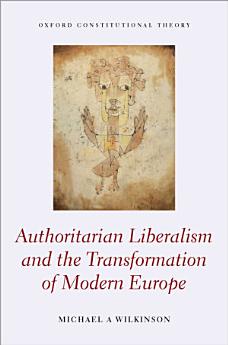Authoritarian Liberalism and the Transformation of Modern Europe
Michael A. Wilkinson
Jun 2021 · Oxford University Press
Ebook
336
Pages
family_home
Eligible
info
reportRatings and reviews aren’t verified Learn More
About this ebook
This title recounts the transformation of Europe from the post-war era until the Euro-crisis, using the tools of constitutional analysis and critical theory. The central claim is twofold: Europe has been gradually reconstituted in a manner that combines political authoritarianism with economic liberalism and that this order is now in a critical condition. Authoritarian liberalism is constructed supranationally, through a taming of inter-state relations in the project of European integration; at the domestic level, through the depoliticization of state-society relations; and socially, through the emergence of a new constitutional imaginary based on liberal individualism. In the language of constitutional theory, this transformation can be captured by the substitution of supranationalism for internationalism, technocracy for democracy, and economic for political freedom. Sovereignty is restrained, democracy curtailed, and class struggle repressed. This constitutional trajectory takes time to unfold and develop and it presents continuities and discontinuities. On the one hand, authoritarian liberalism is deepened by the neoliberalism of the Maastricht era and the creation of Economic and Monetary Union. On the other hand, counter-movements then also begin to emerge, geopolitically, in the return of the German question, domestically, in the challenges to the EU presented by constitutional courts, and informally, in the rise of anti-systemic political parties and movements. Sovereignty, democracy, and political freedom resurface, but are then more actively suppressed through the harsher authoritarian liberalism of the Euro-crisis phase. This leads now to an impasse. Anti-systemic politics return but remain uneasily within the EU, suggesting authoritarian liberalism has reached its limits if just about managing to maintain constitutional order. As yet, there has been no definitive rupture, with the possible exception of Brexit.
About the author
Michael A. Wilkinson is Associate Professor of Law at LSE. He has held visiting professorships at Cornell University, Paris II, the National University of Singapore, and the University of Keio. He teaches and researches in the areas of legal theory, constitutional theory and European integration. His recent publications include Questioning the Foundations of Public Law (Hart, 2018), Constitutionalism Beyond Liberalism (CUP, 2017), 'Beyond the Post-Sovereign State? On the Past, Present and Future of Constitutional Pluralism' (2019) Cambridge Yearbook of European Legal Studies, and 'The Material Constitution' (2018) Modern Law Review. His work has been translated into Portuguese, Italian, Spanish and Turkish.
Rate this ebook
Tell us what you think.
Reading information
Smartphones and tablets
Install the Google Play Books app for Android and iPad/iPhone. It syncs automatically with your account and allows you to read online or offline wherever you are.
Laptops and computers
You can listen to audiobooks purchased on Google Play using your computer's web browser.
eReaders and other devices
To read on e-ink devices like Kobo eReaders, you'll need to download a file and transfer it to your device. Follow the detailed Help Center instructions to transfer the files to supported eReaders.





